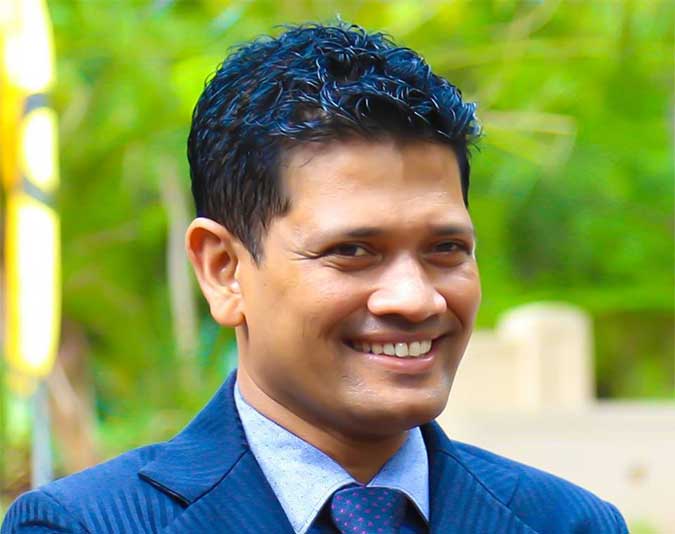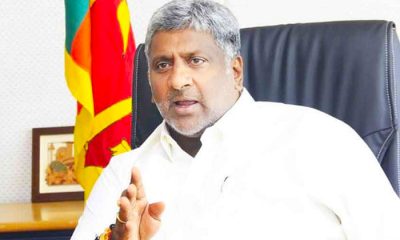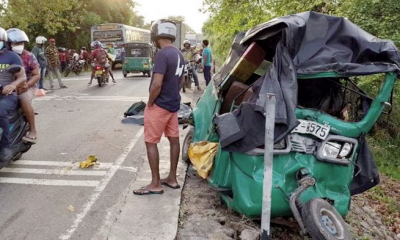News
Children have started losing weight rapidly

By Rathindra Kuruwita
Studying the reports and data from regional health officials show that in certain parts of the country, children have started losing weight rapidly, Prof. G.N. Duminda Guruge, Professor in Health Promotion of the Rajarata University says.Nutrition, especially children’s nutrition, was among the most affected by the country’s severe economic crisis, he said.
“Some pelple say no matter what happens Sri Lankans will survive by eating ‘something.’ This is true. I am sure most people can find something to eat. Yes, the number of meals and the quantity of each meal have decreased for most, but most people eat something. However, one needs to obtain the right amount of nutrition if they are to be assured of long-term wellbeing,” Prof. Guruge said.
Health staff do a lot and those at the grassroots know the gravity of not taking proper nutrition. Health staff at the grassroots check up on children monthly and take measurements, he said.
“Compared to previous years, the number of children who are seriously underweight has increased in certain parts of the country. Weight is not the only thing to worry about, we must also think of the height of children. This is an aspect that is widely ignored, even by parents,” he said.
Prof. Guruge said that he is not certain if the decision makers of the country have felt the gravity of these developments. Nutrition of children is actually an issue that will be felt inter-generationally, he said.
“We are not thinking long term. We are trying to see if we can solve this issue by distributing some goods. Of course, we need to do this to manage the situation in the long term. However, what is our long-term plan? We must use new technologies and empower people. This is the best approach for community health,” he said.Prof. Guruge said that people of the country must feel the need for improved nutrition and wellbeing of the children. At times, officials in charge of health at grassroots are more concerned about the nutrition of children than parents, he said.
“Is this a problem of education? Or are we not communicating properly? We need to educate people in a manner that they understand, and we must also show respect to people,” he said.
Prof Guruge noted that most rural children do get carbohydrates through rice or some tubers. However, they are not getting enough protein because they are expensive.
“We must look at sources of protein that are cheaper and can be accessed where they live. However, changing food habits is not easy. We must look at how these habits have come about. Habits are created. People eat highly processed sugary and starchy food and even during this time of crisis most families spend about 6,000 rupees on these items. An egg is about 60 rupees. You can eat 100 eggs with the money you spend on processed food that is bad for you. Even when eggs were 10 rupees some people didn’t eat enough eggs, but they ate processed food,” he said.
Prof. Guruge said that alcoholism that prevails in certain parts of the country, has also contributed to the malnutrition of children.
“Fathers come home intoxicated and abuse the mothers. Such mothers are often not in a state to worry too much about the needs of children. However, this can only be stopped by community intervention,” he said.
An estimated 6.2 million people (28 per cent of the population) are moderately acute food insecure, while 66,000 people are severely acute food insecure, according to UNICEF. UNICEF said that 41.8 percent of families spend more than 75 per cent of their expenditures on food. This leaves little to spend on health and education. Many families have exhausted their savings and are struggling due to crippling inflation, UNICEF said.
News
US sports envoys to Lanka to champion youth development

The U.S. Embassy in Colombo welcomed the U.S. Sports Envoys to Sri Lanka, former National Basketball Association (NBA) and Women’s National Basketball Association (WNBA) players Stephen Howard and Astou Ndiaye, from June 8 through 14.
The Public Diplomacy section of the U.S. Embassy said that it would launch a weeklong basketball program intended to harness the unifying power of sports, made possible through collaboration with Foundation of Goodness and IImpact Hoop Lab.
While in Sri Lanka, Howard and Ndiaye, both retired professional basketball players, will conduct a weeklong program, Hoops for Hope: Bridging Borders through Basketball. The Sports Envoys will lead basketball clinics and exhibition matches and engage in leadership sessions in Colombo and Southern Province for youth aged 14-18 from Northern, Uva, Eastern and Western Provinces, offering skills and leadership training both on and off the court. The U.S. Envoys will also share their expertise with the Sri Lanka Basketball Federation, national coaches, and players, furthering the development of basketball in the country. Beyond the clinics, they will collaborate with Sri Lankan schoolchildren to take part in a community service project in the Colombo area.
“We are so proud to welcome Stephen and Astou as our Sports Envoys to Sri Lanka, to build on the strong people-to-people connections between the United States and Sri Lanka,” said U.S. Ambassador Julie Chung. “The lessons that will be shared by our Sports Envoys – communication, teamwork, resilience, inclusion, and conflict resolution – are essential for leadership development, community building, equality, and peace. The U.S. Sports Envoy program is a testament to our belief that sports can be a powerful tool in promoting peace and unity.”
News
Rahuman questions sudden cancellation of leave of CEB employees

SJB Colombo District MP Mujibur Rahuman in parliament demanded to know from the government the reasons for CEB suspending the leave of all its employees until further notice from Thursday.
MP Rahuman said that the CEB has got an acting General Manager anew and the latter yesterday morning issued a circular suspending leave of all CEB employees with immediate effect until further notice.
“We demand that Minister Kanchana Wijesekera should explain this to the House. This circular was issued while this debate on the new Electricity Amendment Bill was pending. There are many who oppose this Bill. The Minister must tell parliament the reason for the urge to cancel the leave of CEB employees,” the MP said.However, Speaker Mahinda Yapa Abeywardena prevented Minister Wijesekera responding to the query and said that the matter raised by MP Rahuman was not relevant.
News
CIPM successfully concludes 8th Annual Symposium

The Chartered Institute of Personnel Management (CIPM) successfully concluded the 8th Annual CIPM Symposium, which took place on 31st May 2024. Themed “Nurturing the Human Element—Redefining HRM in a Rapidly Changing World,” the symposium underscored the pivotal role of human resource management (HRM) in today’s dynamic global landscape. Since its inception in 1959, CIPM has been dedicated to advancing the HR profession through education, professional development, and advocacy, solidifying its position as Sri Lanka’s leading professional body for HRM.
Ken Vijayakumar, the President of the CIPM, graced the occasion as the chief guest. The symposium commenced with the welcome address by the Chairperson, Prof. Arosha Adikaram, followed by the Web Launch of the Symposium Proceedings and Abstract Book by the CIPM President. The event featured distinguished addresses, including a speech by Chief Guest Ken Vijayakumar, President of CIPM, and an address by Guest of Honor Shakthi Ranatunga, Chief Operating Officer of MAS Holdings Pvt. Ltd., Sri Lanka.
The symposium also featured an inspiring keynote address by Prof. Mario Fernando, Professor of Management and Director of the Centre for Cross Cultural Management (CCCM) at the University of Wollongong, Australia.
Vote of Thanks of the inauguration session was delivered by Dr. Dillanjani Weeratunga, Symposium Co-chair.
The symposium served as a comprehensive platform for researchers to present their findings across a wide range of critical topics in HRM. These included Cultural Diversity and Inclusion, Talent Development and Retention, Ethical Leadership and Corporate Social Responsibility, Adapting to Technological Advancements, Mental Health and Well-being at Work, Global Workforce Challenges, Employee Empowerment, and Reskilling and Upskilling.
The plenary session was led by Prof. Wasantha Rajapakse. Certificates were awarded to the best paper presenters during the valedictory session, followed by a vote of thanks delivered by Kamani Perera, Manager of Research and Development.
The annual symposium of CIPM was a truly inclusive event, attracting a diverse audience that spanned undergraduates, graduates, working professionals, research scholars and lecturers. This widespread interest highlights the symposium’s significance in the field of HRM, offering a unique opportunity for everyone to network and learn from scholarly brains.The CIPM International Research Symposium was sponsored by Hambantota International Port, Sri Lanka Institute of Information Technology (SLIIT), E B Creasy & Co. PLC, and Print Xcel Company.
























